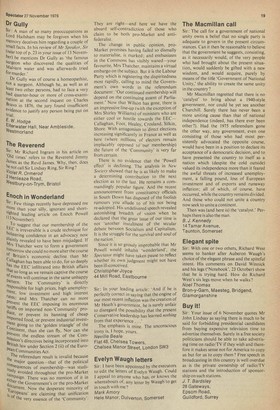Enoch in Wonderland
Sir: Few things recently have depressed me more than your silly, ignorant and shortSighted leading article on Enoch Powell (13 November). To suggest that our membership of the EEC is irreversible is a crude technique for nolstering confidence in an advocacy now Plainly revealed to have been misjudged. If Mrs Thatcher were to form a government tomorrow she could no more alter the course nf Britain's economic decline than Mr allaghan has been able to do, for so deeply "as the EEC infiltrated into British affairs that so long as we remain captive the course °r events will continue in the same unhappy Pattern. The 'Community' is directly resPonsible for high prices, high unemployMent, low investment and high interest rates; and Mrs Thatcher can no more Prevent the EEC imposing its enormous riffs on imported non-'Community' pro'.11ce, or prevent its banning of cheap inVorted food, or prevent industrial investnlent going to the 'golden triangle' of the ‘-ontinent, than she can fly. Nor can she Prevent the endless stream of the Com ission's directives being incorporated into British law under Section 2 (ii) of the European Communities Act. U, The referendum result is invalid because cite major question—that of the political :nsequences of membership—was stuchc.aslY avoided throughout the pro-Market :1111Paign. There was no mention of it in edither the Government's or the pro-Market ,E°eunlent. Now the desperate minority of ur°Peans' are claiming that unification of the very essence of the 'Community'. They are right—and here we have the absurd self-contradiction of those who claim to be both pro-Market and antifederalist.
The change in public opinion, proMarket promises having failed so dismally to materialise, is marked; and enthusiasm in the Commons has visibly waned—your favourite, Mrs Thatcher, maintains a virtual embargo on the subject. But it is the Labour Party which is registering the dispiritedness most rapidly, calling to mind the Government's own words in the referendum document: 'Our continued membership will depend on the continuing assent of Parliament.' Now that Wilson has gone, there is an impressive line-up (with the exception of Mrs Shirley Williams) of ministers who are either cool or hostile towards the EEC— Callaghan, Foot, Healey, Crosland, Silkin, Shore. With antagonism to direct elections increasing significantly in France as well as here (where millions of electors remain implacably opposed to our membership) the future of the 'Community' is very far from certain.
There is no evidence that the 'Powell effect' is declining. The analysis in New Society showed that he is as likely to make a determining contribution to the next election as to the last. He remains a commandingly popular figure. And the recent announcement from constituency officials in South Down has disposed of the foolish rumours you allude to of his not being re-adopted. His undelivered speech revealed astonishing breadth of vision when he declared that the great issue of our time is not 'another instalment of the secular debate between Socialism and Capitalism. It is the struggle for the survival and soul of the nation.'
Since it is so grossly improbable that Mr Powell would inhabit 'wonderland', the Spectator might have taken pause to reflect whether its own judgment might not have been ill-conceived.
Christopher Joyce 44 Mill Road, Eastbourne










































 Previous page
Previous page